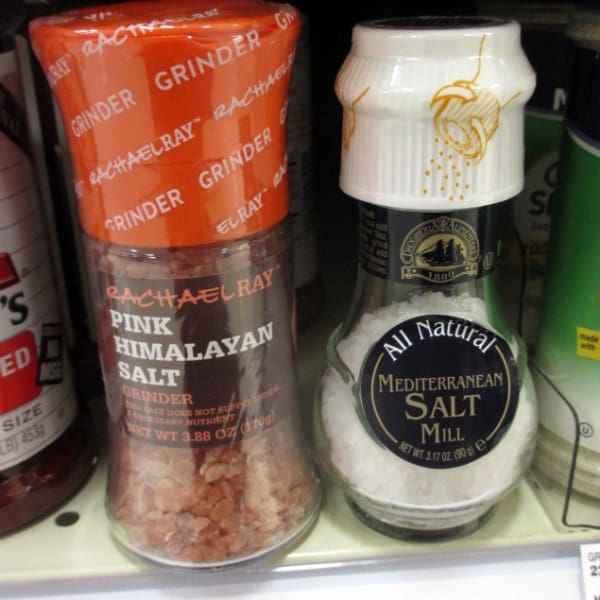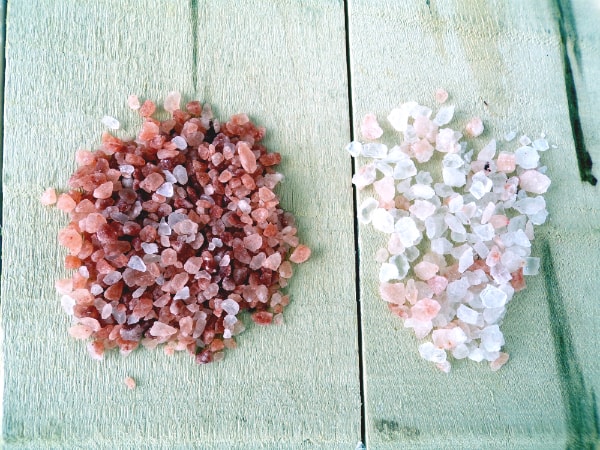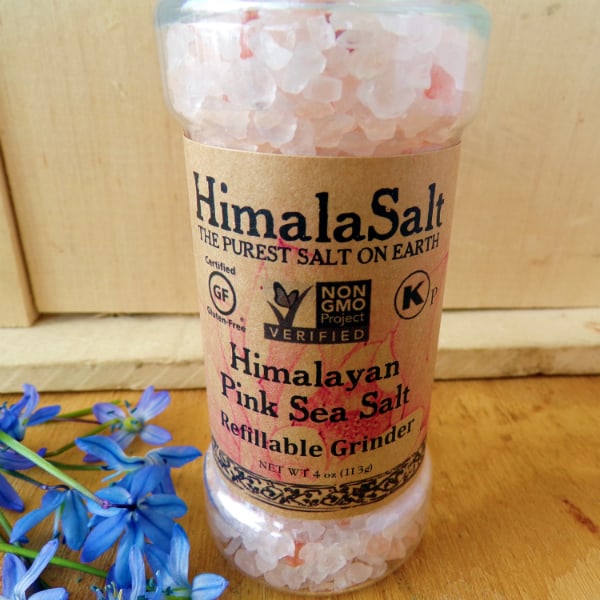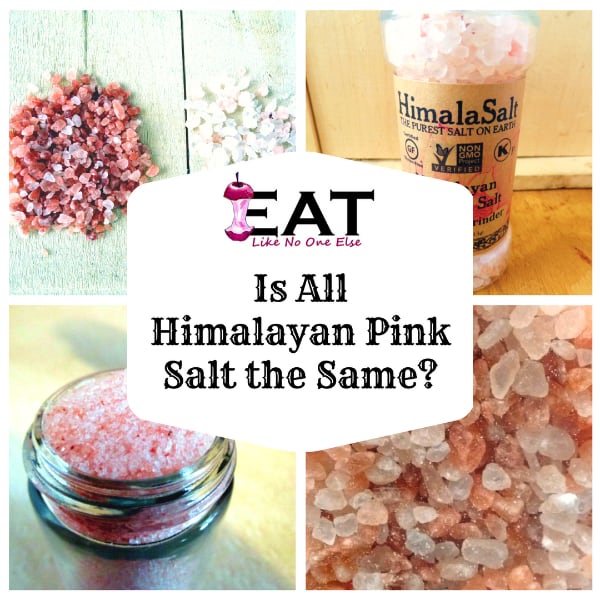This post is sponsored by HimalaSalt
We are a trendy country.
We love our trends.
Log on to twitter right now. What is one of the first things you see? The list of top trending topics, customized just for you.
When something becomes popular everyone wants in.
Food is one of the most trendy topics. And why wouldn't it be. We all have to eat it.
I have seen trends like juicing, superfoods, spiralized vegetable noodles, and unicorn colored foods (yeah I am not touching the last one). Heck even I have bought into this whole Instant Pot craze.
Another trend you may have seen that continues to pick up steam is Pink Himalayan salt. It's everywhere now. Your heatlh food stores. Your co-ops. Your Whole Foods. Your Walmarts. Your Targets. Your Aldis. I am sure there is probably some kid somewhere in suburbia who forgoes the lemonade stand for a Pink Himalayan salt stand. It's everywhere. Even on people's nightstands in the forms of a lamp, I guess in case the need arises to channel your inner horse for a middle of the night lick.
All this begs one really important question - Is all the Pink Himalayan salt the same? And should we pay attention to which pink salt we are choosing to buy?
A lot of the principles in this blog post can be applied to most food you are buying from the store. So pay attention 🙂
Is All Himalayan Pink Salt the Same?
A big fat NOPE! (This blog post would be boring if I said yes, right?)
Shop around for Pink Himalayan Salt at different stores. The biggest noticeable difference you will see is the price. There is pink salt that is dirty cheap and there is pink salt that is a lot more expensive. So why the price discrepancy? There has to be a reason.
Why is There Cheap Pink Himalayan Salt?
This is really a two part answer - we will get to the second part later in this post. Right now think about this - Pink Himalayan salt doesn't come from our backyard unless you live in Pakistan. It is imported into this country. There comes expenses with that. It's clearly less expensive for me to travel from Ann Arbor, Michigan to my house in Milan, Michigan than it is to travel from Ann Arbor to Milan, Italy. It costs money to get all that salt here. Which means somewhere along the way, cost is being cut. And unfortunately that nearly always means at the expense of some hard working laborers.
How are They Paying/Treating their Workers?
This is always an issue to think about when you are buying an imported product. Other parts of the world don't have our labor standards. Yes, America is not perfect either. I still believe that a lot of people are underpaid compared to what the people at the top of the same companies are making - I will refrain from getting on a soap box for this issue for now. In other parts of the world, it's way worse. Inhumane even.
People get paid wages that you couldn't imagine and probably makes you feel very uncomfortable to think about.
Pink Himalayan salt comes from the same general region. However it's not all packed in the same region nor mined by the same people.
Who Are You Buying From?
You need to choose a company that you can trust. Do they have a website with information on their practices? Can you even trace them at all? This can be hard to do sometimes when all you have is a store brand label.

Come on Rachel Ray, who are you sourcing your Pink Himalayan salt from?
When something is trendy, people want to get it on it to make a buck. There are businesses out there that will do that, as long as it's profitable and will abandon ship once it isn't and move onto the next thing. No long term commitment. Just in for a quick cash grab. In fact, most of us probably have no clue who these companies are even - they aren't even trying to build name recognition.
This is important from a quality standard. Someone that doesn't care about the actual product itself and only cares about the money they can make from the product, isn't going to put much thought into producing a quality product. They just want to get it ready and get it sold and move on.
How It Is Packed Matters
Besides the quality of the actual salt itself there may be other issues at stake. The way the salt is packed can be very important for those with food allergies. Wait, who is allergic to salt?
The salt is not the problem. The problem is what the salt is around. Does the packaging faculty use shared equipment with other foods? Someone with a bad allergy could have a reaction from eating salt that came contact with their allergen.
If you have any kind of food allergy it is important to read the label. Best case you choose sources that only package salt on the equipment. They do use a co-packer and they aren't one themselves.
What Makes Himalayan Salt Pink?
Let's tackle an issue of flavor and quality. I don't know about you but I want my salt to make food taste good. This conversation starts with color. Have you ever wondered why the salt is pink? It has to do with the trace minerals that are found in the salt. Particularly iron adds to the color of the salt.

This photo perfectly shows you that not all Himalayan salt looks the same. The stuff on the left is what most of us would probably think is the best, but I say the stuff on the right is far superior, even though it is far less pink or red.
Is Redder Himalayan Salt Really Better?
Somehow we have gotten this idea into our brains that redder food is better. Case in point - the red delicious apple. Bred to be more red and more red throughout the years to the point now where they are almost black in color. What has that done to the flavor? They stopped being delicious decades ago and most people would agree. Now the only time Red Delicious are consumed is at a hotel continental breakfast or at a gas station where it's the only "real food" available.
The original Red Delicious strain was called the Hawkeye. I had one once. It was "delicious". As the apple was bred to be redder the skin actually got more bitter tasting. The same thing can be said for Pink Himalayan salt. The redder the salt is, the more bitter tasting it is.
My tongue can confirm this truth. I picked out some really red and cloudy Himalayan salt and tasted it next to a only slightly pink, opaque salt. The redder the salt, the bitter the taste. It reminded me of table salt - that kind of off, metallic taste. When it comes to choosing Himalayan salt keep this is mind - redder is not better. Choose salt that is a mix of white, rose pink, and orange.
Better Grade of Salt
Remember earlier when I was addressing why there are cheap Pink Himalayan salt? Well this this is the second part of my answer. When it comes down to it there are different grades of salt. Just like not all coffee is the same, not all chocolate is the same, not all mushrooms growing in the wild are the same (Morels I am thinking about you). There are higher grades of Pink Himalayan salt.
As you would expect the higher grade stuff is harder to come by, so in part it should come with a heftier price tag. More work goes into selecting the finest grades by both harvesting only the best and packaging for sale only the best.

Out of all the Pink Himalayan I have seen flooding the market, this one right here is my favorite! Comes in a refillable grinder, not one of those ones you can't open, so you have to toss it when done.
The Pink Himalayan Salt I Recommend
The Pink Himalayan salt that comes with the Eat Like No One Else seal of approval is the Pink Himalayan salt from the HimalaSalt brand. I have tried many Pink Himalayan Salts and according to my taste buds theirs is the best.
So I decided to reach out to them with questions I had about their salt business and was greeted kindly with lots of information from their President and Founder, Melissa Kushi.
HimalaSalt meets all the standards we have discussed in this post. I also support them for these reasons:
- HimalaSalt's facility is certified organic, Non-GMO, gluten-free and kosher for passover year round. They are Non-GMO because they don't add laboratory produced iodine that is based from GMO corn.
- For washing their equipment they use Dr. Bronners organic soap. No harmful chemicals. After the soap they rinse twice with Eden's Organic Apple Cider Vinegar and hot water, followed up with more hot water.
- They have a patent-pending process of removing the dark red salt grains from the salt, leaving just the lighter colors - great for flavor and health.
- Here is what I really love about them, directly from Melissa Kushi:
HimalaSalt is about more than salt. It's about quality and quality of life. We're located on a 6 acre organic farm where our employees receive free farm shares, we are powered 100% by onsite solar, and give 5% back to youth organic farming education. I also pay a living wage. Peoples lives matter.
Looking for a Himalayan Pink Salt Kit?
As a blogger I have a lot of neat tools at my disposal. One of those tools is Google Trends, which tells me what people are looking for - hopefully I can find the answers. As we talked about at the top of this post, Himalayan Pink Salt is certainly trendy. I found that a lot of people are looking for Himalayan Pink Salt kits. This is basically a block of salt that comes with a grater.
You can get one of these (makes a great gift) from HimalaSalt. What I like about theirs is that the grater is an Inox stainless grater. It is a higher quality of grater that won't leave tiny shavings of metal in your food like you could get with chrome or aluminum graters that are more common.
Some Final Comments
What I want you to get out of this post is that there is nothing more key to seasoning your food than salt. This is not an area of your food budget I recommend going cheap on. Take the time and make an investment - granted a small one - when it comes to your salt. Not only will your food taste better, your making a healthy choice for your body and supporting the right people.
What I don't want you to get out of this post is fear or worry. That you have to be able to trace every single thing you eat or your a monster or something. I want to say there is grace to be had. We can't make the perfect choices all the time. We got families to feed. Jobs to work. I get that. I admit I am not perfect when it comes to sourcing all my food from quality, ethical sources. I strive to do the best I can and have grace with myself for the rest as I keep educating myself. That's what we are going to keep doing here at Eat Like No One Else!
When it comes to something as simple, but as important as salt, I think that's worth the time. So DO NOT take salt "with a grain of salt" if you get what I am saying 🙂
Have you found this topic and post very interesting and useful. First thanks for thinking so. If you want to read more posts like this, sign up for our email list in the box below.
[yikes-mailchimp form="1"]




Gabriela Kamel
Thank you. Everything you said matters to me. It is so good to know that I cam make a simple, affordable and ethical choice today.
Eric Samuelson
I am glad I could be of help.
Linda T Minton
I rarely read long blog posts, just skim them to get “the gist.” But this one was so interesting and important that I read and absorbed every word. Thank you.
Eric Samuelson
Thanks so much for the kind words, I am glad you enjoyed the post.
Marla D Bateson
Thanks for your input. There are some children that I know that school is shut down. So we will have a class at home. We will study Salt, where it comes from, different kinds of salt, why it is important, what we can use it for and so much more.
So your site clear up some questions I had and how important it is to guide children correctly for them to make wise choices.